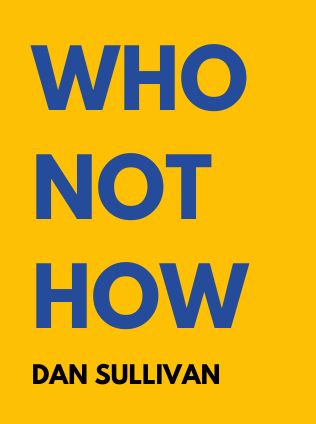
Who Not How
The Formula to Achieve Bigger Goals Through Accelerating Teamwork
By Dan Sullivan
Published 10/2020
About the Author
Dan Sullivan is widely recognized as one of the world's most effective entrepreneurial coaches. He is the co-founder of Strategic Coach®, a premier coaching program that has provided guidance and training to over 20,000 entrepreneurs worldwide. Sullivan's expertise lies in helping entrepreneurs unlock their full potential by leveraging the power of collaboration and innovative thinking. With a career spanning more than 35 years, he has authored over 50 publications focused on entrepreneurial success and personal development. In "Who Not How," Sullivan collaborates with Benjamin Hardy, a renowned author and organizational psychologist. Hardy was brought on as the 'Who' to help articulate and expand upon Sullivan's core concepts, demonstrating the book's central thesis in action.
Main Idea
The central premise of "Who Not How" is a paradigm shift from a self-reliant mindset to one that embraces collaboration. Sullivan and Hardy argue that instead of asking, "How can I do this?" individuals should ask, "Who can help me achieve this?" This shift allows people to leverage the strengths, skills, and expertise of others, enabling them to accomplish more than they could alone. The book contends that this approach not only leads to greater achievements but also fosters deeper and more meaningful relationships, enhancing both personal and professional growth.
Table of Contents
- Introduction: The Paradigm Shift
- Part I: The Power of Who
- Freedom of Time
- Freedom of Money
- Freedom of Relationship
- Freedom of Purpose
- Part II: Implementing the Who Strategy
- Identifying Your Whos
- Creating a Self-Managing Company
- Overcoming Common Obstacles
- Conclusion: Living the Who Not How Way
Analyzing and Explaining Key Concepts
Introduction: The Paradigm Shift
The introduction lays the foundation for the book's main idea: the shift from a "How" mindset to a "Who" mindset. Sullivan and Hardy explain that American culture highly values independence, often leading individuals to take on more than they can handle. This mindset can limit one's potential, as it disregards the value of leveraging others' skills and expertise. The authors advocate for a shift in thinking, where individuals ask, "Who can help me achieve this?" instead of "How can I do this?" This simple yet powerful change in perspective can open up new possibilities and lead to greater success.
Part I: The Power of Who
Freedom of Time
This section explores how delegating tasks to others can free up one's time, allowing for more focus on high-value activities. The authors argue that time is a flexible and infinite resource, directly influenced by the quality of the 'Whos' one surrounds oneself with. By delegating tasks to capable individuals or teams, one can focus on what they are uniquely qualified to do, thereby increasing productivity and personal satisfaction.
Entrepreneurs, in particular, often struggle with time constraints because they feel the need to be involved in every aspect of their business. However, by creating a "Self-Managing Company," where capable 'Whos' handle various aspects of the business, entrepreneurs can free up their time to focus on strategic vision and innovation. This approach not only enhances personal freedom but also leads to a more efficient and effective organization.
Sign up for FREE and get access to 1,400+ books summaries.
You May Also Like
The Subtle Art of Not Giving a F*ck
A Counterintuitive Approach to Living a Good Life
By Mark MansonRich Dad Poor Dad
What the Rich Teach Their Kids About Money - That the Poor and Middle Class Do Not!
By Robert T. KiyosakiHow To Win Friends and Influence People
The All-Time Classic Manual Of People Skills
By Dale CarnegieQuiet: The Power of Introverts
The Power of Introverts in a World That Can't Stop Talking
By Susan Cain



















